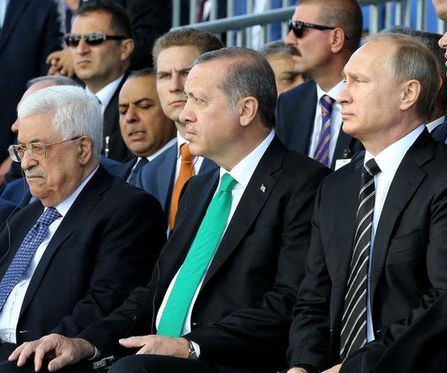 US President Donald Trump, who next month celebrates his first year in office, has formally recognized Jerusalem as the capital of Israel. He has ended decades of American diplomacy by ordering the State Department to prepare for moving the US Embassy to Jerusalem, drawing anger and despair from people and leaders throughout the world, who now expect a possible third uprising in the Occupied Territories, the collapse of Palestinian-Israeli peace efforts, the strengthening of extremists and an effect on the standing of the US in the world, mainly in the Middle East.
US President Donald Trump, who next month celebrates his first year in office, has formally recognized Jerusalem as the capital of Israel. He has ended decades of American diplomacy by ordering the State Department to prepare for moving the US Embassy to Jerusalem, drawing anger and despair from people and leaders throughout the world, who now expect a possible third uprising in the Occupied Territories, the collapse of Palestinian-Israeli peace efforts, the strengthening of extremists and an effect on the standing of the US in the world, mainly in the Middle East.
Trump’s recognition of Jerusalem as Israel’s capital was one of his presidential campaign promises, but hardly anyone imagined it would be among those he kept.
Last week’s announcement turned Washington into a dishonest broker in any future talks between the Palestinians and the Israelis, opening the door wide for Arabs to seek Russian, Chinese and European support.
Though Trump received many warnings from Arab and European leaders and UN Secretary General Antonio Guterres, he insisted on his decision to move the embassy.
The Oslo Accords between the Palestinians and the Israelis, which were signed in 1993 in the White House by former Palestinian leader Yasser Arafat and Israeli Prime Minister Yitzhak Rabin, with the attendance of then-President Bill Clinton, stated that the final status of Jerusalem had to be settled by negotiations.
The dominant majority of the international community has condemned this decision and called on the White House to revise it.
Russia’s Foreign Minister Sergei Lavrov characterised it as “defying common sense”, while President Vladimir Putin shared his deep concerns. Putin phoned his Turkish counterpart following Trump’s announcement, calling for the Palestinians and Israelis to “hold back” and to renew talks.
Putin had a short trip to the Middle East on Monday, paying an unexpected visit to Syria, notably the Khmeimim air base, where he met Bashar Assad and ordered Russian troops’ partial withdrawal from Syria. After that, he held talks with President Abdel Fattah El-Sisi in Egypt and Recep Tayyip Erdogan in Turkey. The issue of Jerusalem and the future of the peace talks were among the important topics that were discussed.
Putin’s surprise visit boosts country’s standing in the region amid fallout from US decision to recognize Jerusalem as Israel’s capital.
– Maria Dubovikova
The current situation gives great opportunities to Russia to strengthen its position in the Arab world. Russia has proved to be an honest peace broker in Israeli-Palestinian talks for years — its position is unbiased and unchangeable. The US manoeuver permits Russia to fill the void, attracting the region’s countries into its network of cooperation.
Putin is seizing these opportunities with his brief Middle Eastern tour. Turkey, which is also gaining power in the region, is becoming a key partner for Russia. After the collapse of their bilateral relations following the downing of a Russian jet on the Syria-Turkey border two years ago, their relationship has been fully restored, and has even reached new levels. At the same time, Turkey is one of the few countries which permits itself to use tough rhetoric against the West, and it expressed in a threatening way its disagreement with the White House’s decision on Jerusalem. Russia stands by the side of President Erdogan and other leaders in the region, thus getting into an advantageous position.
The US is deeply involved in all Arab countries politically, militarily, economically and financially, but it arguably has a track record in sowing instability with notorious regime-change policies. Taking this into account, the Arabs are now grappling with the mistakes they made in previous decades.
The issue of moving the embassy dates back to 1995, when the US Congress passed a bill recognizing Jerusalem as the capital of Israel. But that bill includes an item that allows US presidents to effectively postpone the transfer decision for six months to protect American national security interests. US presidents have been postponing this decision ever since.
Moving the US Embassy to Jerusalem is merely symbolic, but it is an adequate reason for possible further chaos in the Middle East.
Palestinians feel they have been negotiating for peace for more than 20 years and have ended up with zero result. The Israeli-Palestinian peace process ended irreversibly with the US recognition of Jerusalem as the capital of Israel — it is a bizarre decision, but how can the Arab world reverse it?
